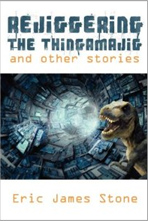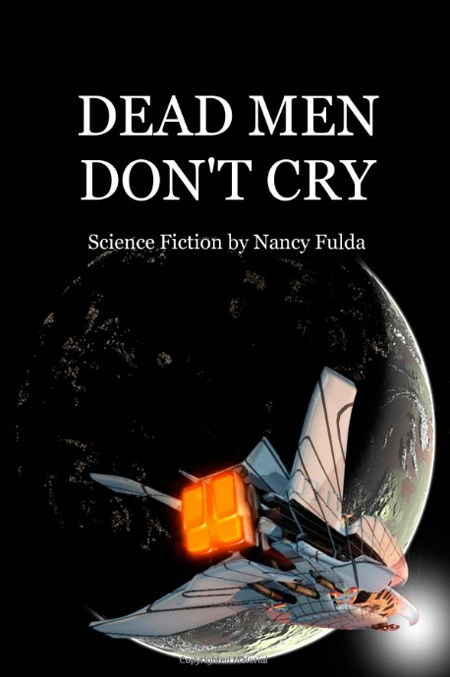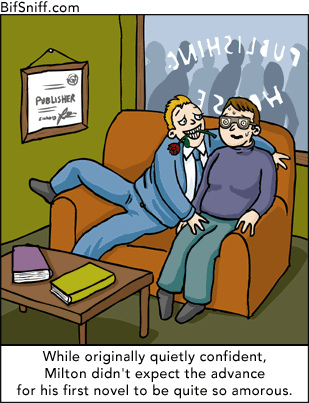This is guest post by Donald Mead is part of the “Writing and the Martial Arts” series, in which other writer/martial artists talk about parallels between these two seemingly very different disciplines.
Donald Mead is a Writers of the Future winner, and his work has also appeared in The Magazine of Fantasy and Science Fiction and Strange Horizons.
You may be interested in the two earlier posts in the series, both by black belt, professor of History and Philosophy, and fantasy novelist Steve Bein: “How Do You Like Your Chances?” and “Writing and Punching.”
In Japanese martial arts culture, the pen and sword exist together as equals. This contrasts with the Western adage: “the pen is mightier than the sword.” The historical roots of the Japanese view come from certain restrictions imposed by the Tokugawa Shogunate and from Bushido, the philosophy of the warrior. Both of these topics are as dull as they sound.
I’ve found surprising similarities between martial arts and writing that are much more personal, in particular, the concept of mushin or empty mind.
Me? I have black belts in Shotokan karate, kendo, iaido and minor training in a variety of other arts. Thirty years of training in all, and I have to admit, I’m tired, but I’ve learned a few things.
One of those arts I mentioned is iaido, which is the Japanese sword art of drawing, cutting and returning the blade to its saya (scabbard). I’ve also had years of training in Shinkendo, which is an Americanized version of Japanese sword. Both of these arts make use of two-person exercises in which one person cuts at the defender, and the defender blocks. The number of cuts and blocks increases with the skill level of the students. Mind you, this isn’t kendo with its flexible bamboo swords and thick padding from head to toe. In this traditional art, the participants have no armor and use solid-wood bokken (wooden swords).
Once, we invited a Japanese instructor from California to lead a seminar. We learned a rather fast and dynamic two-person exercise–a series of cuts and blocks moving in a square. Step-cut, block, step-cut, block, cut and square up to your partner. Hard to describe–harder to do. There’s a lot to keep in mind in these types of exercises. The cut has to be aimed at the head or your partner has no reason to block. The block has to be at the correct height and angle or you’ll end up with a cracked noggin. And of course, there’s footwork. It’s a dance with consequences more serious than stepped-on toes.
After class, we treated Sensei to dinner and a couple of drinks. Someone asked about the footwork of the exercise and Sensei responded “Oh, there is no footwork in this art.”
This had all of us more than befuddled since Sensei had been pounding us about footwork for the past three hours. Here’s what he meant we eventually figured out. We learned a new exercise that required us to concentrate on technique: footwork, cutting angle, blocking, distancing and timing. We went slowly over the months, breaking down each move and smoothing out the bumps (figurative and literal). We celebrated small milestones like getting all the way through without tripping over ourselves. Later, we felt brave enough to speed up–not as fast as Sensei, but pretty good. Within a year, we were doing the exercise with no hesitation. There was no thought of our feet, or of getting
our fingers bashed or the effectiveness of the block. We were simply building and maintaining the energy of the exercise that flowed from one side to the other. That’s mushin–the mind doesn’t stop to think about technique or safety. That’s all built in now–instinctual. But you’re not empty-headed either. You have a partner, and you’re having a non-verbal conversation. To the participants the swords and footwork are gone, but the energy of the conversation is real and quite pleasant in most cases. That’s what Sensei meant when he said the art had no footwork. A student might begin with footwork, but at an advanced level, the footwork doesn’t matter at all.
I was a white belt when I started writing fiction. A beginner. I didn’t know that at the time; I thought I had all the tools I needed to write. I took one of my stories to a writers’ workshop at Chicon 2000 and had an eye-opening experience. I mean, what was this point of view thing the pros kept harping about? And what was wrong with my thirty adverbs per page? They didn’t even like my surprise ending where the main character wakes up, and it was all a dream. Yep, it was that bad.
I had to learn how to write step by step. Just like a martial arts student learning the cut, block and footwork, I had to learn the basics of prose, and that took concentration. My flabby verbiage had to go along with most of those adverbs and passive sentence structure. Then I had to think about my stilted
dialogue and how to smooth it out. Finally, I had to think of the story as a whole–the use of tension, the motivation of my characters, the believability of the fantasy element and a satisfying and logical ending.
You know that “million words” saying? I my case it applied; I wrote at least a million words before my writing noticeably improved and I started making sales. But by that millionth word, I wasn’t thinking about the prose anymore. All of those writing rules, the traditional ones and my personal ones, were all instinctive. I saw a picture of the story in my mind, and my hand moved over the paper. It wasn’t perfect mind you, a fact my critique group is quick to remind me, but the fundamentals were there now.
I bet you’ve been there–writing in the zone. When the story takes off and your hand can barely keep up. That’s mushin.








 Joy Marchand is a writer, poet, and editor. I met her at the 2004 Writers of the Future workshop, where her terrific short story “Sleep Sweetly, Junie Carter” (written as Joy Remy) won her a spot in Writers of the Future XX. My “Bottomless,” a story of a young man exiled from his village located deep within a bottomless pit, appeared in the same volume, but Joy’s story of a woman trying to cope with more time than any human is made to handle may well be my favorite in the book.
Joy Marchand is a writer, poet, and editor. I met her at the 2004 Writers of the Future workshop, where her terrific short story “Sleep Sweetly, Junie Carter” (written as Joy Remy) won her a spot in Writers of the Future XX. My “Bottomless,” a story of a young man exiled from his village located deep within a bottomless pit, appeared in the same volume, but Joy’s story of a woman trying to cope with more time than any human is made to handle may well be my favorite in the book.


